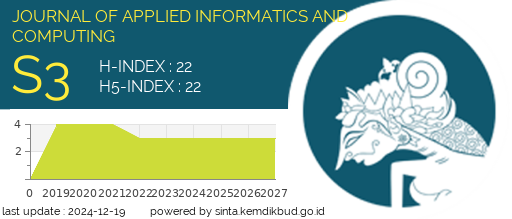Expert System for Diagnosing Newborn Babies Disease Using the Sorgenfrei Similarity Method
DOI:
https://doi.org/10.30871/jaic.v4i2.2192Keywords:
Expert System, Infant, Neonates, SorgenfreiAbstract
Newborn neonates who are 0-28 days old. At that time the baby has a physical condition that is very weak and helpless to the surrounding environment. Newborns need special handling different from babies at the age of 1 month also above. Diagnosis also treatment is quickly required by the midwife in an emergency. Without there are still many midwives who have not been able to handle it properly, causing the baby's condition to become worse. To get fast and accurate handling information, we need a system in the form of an expert system. Expert systems can diagnose newborn diseases using the Sorgenfrei similarity algorithm. The system can display information about the type of disease, symptoms, solutions, and the percentage of similarity from the results of consulting the symptoms input. The results of testing the system with the consultation of the symptoms included got the highest percentage of similarity results 53.33%. The percentage of similarity results below 20% will be entered into the revised table which will later be corrected by experts. This expert system is built based on a website that can be accessed by all midwives who need handling information
Downloads
References
E. M. R. Shehab El-Din, M. M. A. El-Sokkary, M. R. Bassiouny, and R. Hassan, "Epidemiology of neonatal sepsis and implicated pathogens: A Study from Egypt," Biomed Res. Int., vol. 2015, 2015, doi: 10.1155/2015/509484.
S. S. A. Naser and I. A. El Haddad, "An Expert System for Genital Problems in Infants," vol. 2, no. May, pp. 83"“86, 2016.
Ministry of Health, "Indonesia Health Profile 2014," Kementeri. Kesehat. Republik Indones., vol. 51, no. 6, p. 40, 2015, doi: 10.1037/0022-3514.51.6.1173.
M. A. M. Reis, N. R. S. Ortega, and P. S. P. Silveira, "Fuzzy expert system in the prediction of neonatal resuscitation," Brazilian J. Med. Biol. Res., vol. 37, no. 5, pp. 755"“764, 2004, doi: 10.1590/S0100-879X2004000500018.
Bassem S. Abu-Nasser, "Medical Expert Systems Survey," Med. Arh., vol. 49, no. 3"“4, pp. 107"“112, 2017.
Alaa N. Akkila and Samy S. Abu Naser, "Proposed expert system for calculating inheritance in Islam," World Wide J. Multidiscip. Res. Dev., vol. 2, no. 9, pp. 38"“48, 2015.
Amin, I. H. A, & Suhartono, S. (2012) Expert Systems Detecting Hair Damage Using Rule Base Reasoning with the Forward Chaining Method. JSINBIS (Journal of Business Information Systems), 2 (3), 134-138
A. Z. A. O. Samy S. Abu Naser, "an Expert System for Diagnosing Eye Diseases Using Clips," Theor. Appl. Inf. Technol., vol. 3, no. December, pp. 923"“930, 2008.
S. S. A. Naser and I. A. El Haddad, "An Expert System for Genital Problems in Infants," Int. J. Med. Res., vol. 1, no. May, pp. 83"“86, 2016, [Online]. Available: http://ssrn.com/abstract=2814417.
A. Rahman, C. Slamet, W. Darmalaksana, Y. A. Gerhana, and M. A. Ramdhani, "Expert System for Deciding a Solution of Mechanical Failure in a Car using Case-based Reasoning," IOP Conf. Ser. Mater. Sci. Eng., vol. 288, no. 1, 2018, doi: 10.1088/1757-899X/288/1/012011.
H. Y. A. Abutair and A. Belghith, "Using Case-Based Reasoning for Phishing Detection," Procedia Comput. Sci., vol. 109, pp. 281"“288, 2017, doi: 10.1016/j.procs.2017.05.352
Downloads
Published
How to Cite
Issue
Section
License
Copyright (c) 2020 Imam Husni Al Amin

This work is licensed under a Creative Commons Attribution-ShareAlike 4.0 International License.
Authors who publish with this journal agree to the following terms:
- Authors retain copyright and grant the journal right of first publication with the work simultaneously licensed under a Creative Commons Attribution License (Attribution-ShareAlike 4.0 International (CC BY-SA 4.0) ) that allows others to share the work with an acknowledgement of the work's authorship and initial publication in this journal.
- Authors are able to enter into separate, additional contractual arrangements for the non-exclusive distribution of the journal's published version of the work (e.g., post it to an institutional repository or publish it in a book), with an acknowledgement of its initial publication in this journal.
- Authors are permitted and encouraged to post their work online (e.g., in institutional repositories or on their website) prior to and during the submission process, as it can lead to productive exchanges, as well as earlier and greater citation of published work (See The Effect of Open Access).











